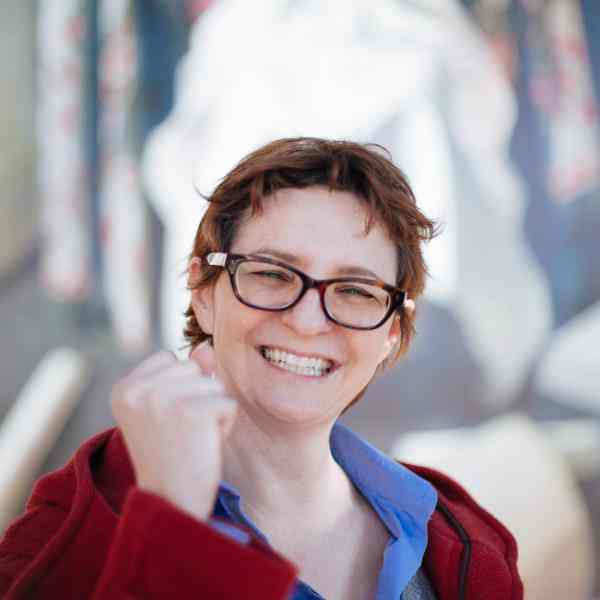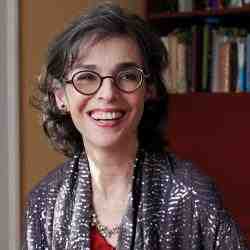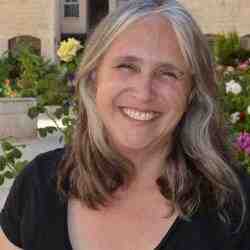Introduzione
Marie is working to overcome and knocking down gender stereotypes barriers. She is empowering girls to allow themselves to dream with no bias like their male counterparts. She does this through innovative training and active learning experiences that engage young girls, young male teenagers, schools and teachers, and companies; as well as running communication campaigns for the broader audience.
La nuova idea
Marie is expanding learning opportunities for pre-teen girls and changing mind-sets of teenage boys, by challenging gender stereotypes and opening barrier-free perception of career opportunities for young women. Guided by a strong belief that boys can play a significant role in changing age-old narratives about what young women and girls can achieve, Marie encourages teenage boys to serve as mentors and role models to their younger, female counterparts.
Marie is working to expand career opportunities for girls, particularly in the STEM fields of science, technology, engineering and mathematics. Through her ground-breaking initiative called Bet She Can, Marie is dismantling entrenched stereotypes and expectations that often deter young girls from considering the full range of options that might be available to them.
She is empowering girls between the ages of 8 and 12 to become aware of their limitless potential and providing them with the tools they need to develop the skills that will help them unlock it. It is her steadfast belief that fostering relationships that span lines of gender and age, will help inspire young girls and boys alike and serve as a model for the kind of educational and career path they can forge for themselves, especially in fields that are traditionally male-dominated.
Through her main program, Marie connects elementary school girls with teenage boys who attend vocational schools, encouraging them to work together on a project within the STEM field. On its face, Marie’s approach seems like an unconventional one. However, working to solve a common problem, allows participants to be creative, open-minded and collaborative. Such an exercise not only fosters empathy and understanding, but also serves as a powerful blueprint for the types of dynamics and interactions girls can strive for along their educational or career journeys.
Gender inequality isn’t something that is often tackled in a systematic way. In Italy, as is the case in many other more economically developed countries, individuals who hope to break down deeply held ideas about gender, focus much of their energy on teenage girls or young adults. Based on her knowledge of recent data, Marie wholeheartedly believes that for an initiative to be effective it must focus on teens or younger children. After all, the perceptions children have about certain jobs and careers are formed and sometimes cemented at a young age.
According to the 2017 Global Gender Gap Report, by the time they reach young adulthood and enter university, girls’ confidence in STEM related subjects’ plummets, thanks in large part to the ways in which girls are conditioned from a young age about their educational or career journey. According to Marie’s survey data, roughly 31% of elementary school girls say that they feel confident when it comes to mathematics. During Middle School (i.e. Junior High) this percentage drops to a mere 18%.
The fact that Marie’s program is geared towards girls at such an early age, is what makes the Bet She Can model so unique. Through her work, Marie strives to focus the root of the problem of gender stereotypes- when they first occur- instead of merely addressing the symptoms of the issue. While there are several programs and initiatives that are focused on encouraging young women to be involved in STEM, either by teaching coding or other IT related skills, there aren’t many which directly target preteens. There are even fewer that pair those girls with older teenagers in order to encourage mentorship. In this sense, Bet She Can is ahead of the curve and Marie’s work is breaking the mold.
Il problema
According to an article by the University of Florence published on the Education Science and Societies Journal in 2014, the formation of gender roles occurs so early that its effects are already manifested in the first years of life, precisely because of this there is a risk of their mistakenly being considered “innate”. The split between male and female destinies is shaped from early infancy when males and females begin to weave different biographical paths in the family. This is the result of small but continuous daily choices that gradually channel the course of the one group and that of the other towards different, ever more divergent, routes.
According to the World Economic Forum’s 2017 Gender Gap Report, which measures gender parity across the globe, there is an average gender gap of 25%.
In Europe, where gender parity is the reality for a number of countries, there is an important North-South divide. At the bottom of the ranking for the continent, four countries have a gender gap above 30%: Greece, Italy, Cyprus, and Malta.
Italy, where Marie has focused her activities over the past few years, ranks 82nd out of the 144 countries surveyed in 2017. Here, the score is extremely poor on the “Economic participation and opportunity” index (118th out of 144 countries).
Deeply entrenched stereotypes along gendered lines have certainly coloured many professions in Italy, In the Italian parliament for example, women make up only 30.7% of lawmakers. In the entrepreneurial world, women entrepreneurs account only for the 26%. In other sectors the situation is reversed: in the healthcare sector for example, 70% of employees are women; among teachers, the number rises until around 75% and when it comes to family services 9 out of 10 workers are women.
Unlike traditional high schools, vocational schools were meant to be places where students could gain professional experience in a variety of sectors. In reality however, well-educated families send their children to the Lyceum and Science High Schools knowing their kids will attend University, while lower- and middle-income families send their children to vocational (care-related high schools for girls, technical/professional high schools for boys) hoping that they might be able to find a job upon graduation. Roughly 90% of students in technical/professional schools are male, while the percentage is reversed for what concerns teacher training and psycho-pedagogical schools.
Relying on statistics gathered by the European Commission Italy shows an important contrast in this field. The gender pay gap (difference in average gross hourly wage between men and women) stands at 5.3% (much lower than the EU average 16.2%). This is largely due to the fact that wages are not negotiated privately between employees and employers, but often standardly set by an agreement between trade unions and Employers organisations. Nonetheless, the gender overall earnings gap (difference between the average annual earnings between women and men) takes into account three types of disadvantages women face: lower hourly earnings; working fewer hours in paid jobs and lower employment rates. The gender overall earnings gap in Italy stands at 43.7% (the average gender overall earnings gap in the EU is 39.6%).
There are entrenched parental attitudes and practices toward girls differing from those toward boys (e.g. how often parents tell girls to be careful compared to boys). Similarly, the Italian School Curriculum and its schoolbooks is obsolete under this perspective and, implicitly, reinforce gender stereotypes rooted in our society.
According to UIS data, less than 30% of the world’s researchers are women.
In Italy, the percentage of the total employed population is 74,5%, while the percentage of employed women is lower than 50% (48,1%). At the institutional top ranks and other high-profile positions in Italy women are only the 14,4%.
It is demonstrated that girls’ confidence in STEM topics plummets by the time they go to college. According to recent statistics, 31% of elementary school girls state to feel confident in mathematics, and during Middle School this percentage drops to mere 18% of girls. This is also a crippling factor for corporations and firms which do not benefit from gender diverse workforces.
Considering the gender and class dynamics at play, it is interesting to analyse some data about behavioural attitudes in schools. Even though the overall bullying rate does not seem to have increased in vocational schools, according to the 2014 ISTAT report, almost half (46,8%) of the students have been subject to taunts and threats inside vocational schools; these data are far more common and serious in male-attended schools.
La strategia
Marie involves preteen girls and male teenagers from vocational schools into two main programs: “ Con l’altra metà del cielo” and “Tribù”.
“Con l’altra metà del cielo” (literally, “With the other half of the sky”) is the main program that Marie is carrying on. It aims to broaden the range of opportunities and choices available to pre-teen girls: by fostering partnerships between pre-teen girls and the students at vocational schools, Marie hopes to show girls all the possibilities that are available to them when it comes to their education and career choices. She uses STEM subjects and activities as a means to the young pre-teen girls to broader their horizons and encouraging them to dream big.
At the same time, she is increasing empathy and responsibility among male vocational school students: the proximity of pre-teen girls to vocational schools’ male students is beneficial in terms of school performances, behaviour and empathy building. Showing STEM topics and related activities to young girls has an important impact in terms of responsibility and sensitivity skills’ development. Boys become girls’ tutors while they materially work on a shared project such as building a robot, or a little trolley controlled remotely to carry school bags. These projects are shown at the elementary schools by the end of the year. Girls and their parents, going through the exposition, are able to see and to get passionate about what is done inside vocational schools.
Through partnerships with schools, but also institutions (local administrations, museums), associations or social cooperatives Marie carries on a series of collateral activities and workshops. An example of this collaboration is “La Tribù”, a treasure hunt over 6 months around the city, where young girls discover unconventional (in terms of gender) professions; on a different level, through the collaboration with the Ministry for Instruction and the State Department for Equal Opportunities, Marie works to achieve an even deeper impact at the institutional level. Marie opened a YouTube channel where she uploads videos about “La tribù” adventures and short video clips tackling gender issue in different ways to reach out to a broader audience.
She is collaborating with the publishing company “Carthusia Edizioni” for a book editing, aimed to let children grow unbiased from gender stereotypes. Among the other activities that she is working on, there she had developed a partnership with QVC, a media outlet aimed mostly at women. Marie takes part to interviews with other experts of the sector aimed to understand self-esteem and self-awareness mechanisms in children. She is engaging the Ministry of Education to tackle the issue of under-representation of girls and women in school books. Finally, she is collaborating with “Gruppo Ferrovie Dello Stato” (Italian Railway Association), Mattel and Swarowski for the dissemination of gender issue narrative, toys (with Mattel), etc.
Marie’s work has already proven to be successful. Material proof of this success are the independent replications of institutes which particularly liked the project. In the short term, Marie wants to consolidate the activity in Italy and also begin testing out her model in other European countries. Her long term goals involve scaling up her model. Marie hopes to expand her platform to reach other countries.
Many schools that started to work with her are now replicating independently the program and have integrated it in their yearly schedule.
Bet She Can has the organizational shape of a non-profit foundation. It operates through crowdfunding campaigns and functional partnerships in order to implement its empowerment paths for young girls. According to initial goals and partners’ needs, Bet She Can proposes different tailored projects or coherent personalization of already existent initiatives.
The foundation manages the whole project creation process, selecting the partner and developing the implementation acting as project manager, making sure that the whole path mirrors the foundation principles and that initial goals are fulfilled.
More than 90% of the financial contribution comes from firms and other organizations, while the remaining 10% comes from private donors.
Through the plurality of projects implemented since the start of its activity in 2014, Marie has managed to involve almost 6000 students and teachers directly. Counting their families who were involved in the program she reached more than 12000 people.
Marie is keeping track of her impact using in-surveys and out-surveys for girls and boys involved in her programs. She has some key findings including a growth of interest in technology from 42% to 70% for girls involved in her program. With the data collected by surveys with boys, the evidence is that about 20% of them had ever thought about gender stereotypes while 80% answered that they rarely did. Boys involved, moreover, performed better grades compared to those who were not involved in the program.
La persona
Marie Madeleine was born in 1971. Thanks to her father’s career, she moved often as a child--spending time in Canada, Holland, and Germany. Her experiences abroad helped shaped her and made her into the open, curious, trailblazer she is today. Marie attended university in Paris and studied Economics, and then subsequently moved to Italy.
As a student, Marie worked as volunteer at an organization in Pigalle, providing after school tutoring and support to students whose parents were still at work. This made her aware of the unlocked potential that children have.
In 2003, Marie was involved in a terrible car accident. After she survived, she recommitted herself to working towards her goals. When her first child was born in 2008, motherhood changed her priorities in life. She realized that a lot of limits and restrictions imposed on her were mental and introduced by stereotypes and schemes in education and relationship development. She remembers a conversation she had with a girl's mother that was playing with her daughter when they were around two years old. She said she would have preferred a boy because life would have been easier for him. Marie was shocked but somehow, she also knew that she was right and that she wanted to take actions to change this mind-set. She decided then that she wants for her daughter and for all kids to open a future where self-awareness is enhanced, without mental “cages” imposed by society and education.




